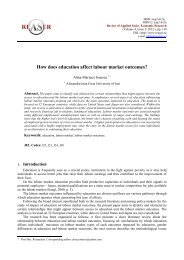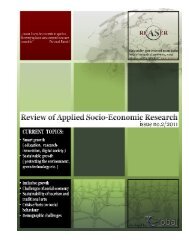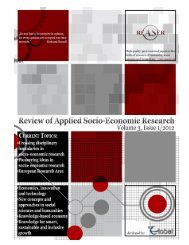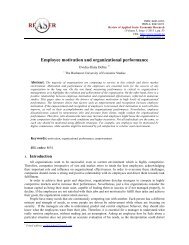new characteristics of inequalities in the information society and ...
new characteristics of inequalities in the information society and ...
new characteristics of inequalities in the information society and ...
Create successful ePaper yourself
Turn your PDF publications into a flip-book with our unique Google optimized e-Paper software.
ISSN: 2247-6172;<br />
ISSN-L: 2247-6172<br />
Review <strong>of</strong> Applied Socio- Economic Research<br />
(Volume 5, Issue 1/ 2013 ), pp. 88<br />
URL: http://www.reaser.eu<br />
e-mail: editors@reaser.eu<br />
that <strong>new</strong> liquidity requirements will necessitate banks to clutch more capital. A manner has been set <strong>in</strong> which<br />
capital could be used to dis<strong>in</strong>centive maturity mismatches.<br />
In a f<strong>in</strong>ancial crisis <strong>the</strong> liquidity <strong>of</strong> assets falls as <strong>the</strong> maturity <strong>of</strong> f<strong>in</strong>anc<strong>in</strong>g contracts, which br<strong>in</strong>gs a<br />
bank to put aside capital for liquidity us<strong>in</strong>g exist<strong>in</strong>g measures <strong>of</strong> <strong>the</strong> liquidity <strong>of</strong> assets <strong>and</strong> liabilities. The<br />
implication is that for regulatory purposes <strong>the</strong> liquidity def<strong>in</strong>ition <strong>of</strong> assets could be fixed <strong>in</strong>to two camps<br />
(liquid <strong>and</strong> illiquid) <strong>and</strong> <strong>the</strong> capital requirement could be different <strong>in</strong> different times.<br />
The liquidity based on <strong>the</strong> capital adequacy requirement can be multiplied by a factor that is<br />
reflected <strong>in</strong> mismatch <strong>of</strong> <strong>the</strong> degree <strong>of</strong> maturity between pools <strong>of</strong> assets <strong>and</strong> pools <strong>of</strong> fund<strong>in</strong>g. Assets that <strong>the</strong><br />
central bank does not consider suitable for post<strong>in</strong>g <strong>of</strong> liquidity will be supposed to have a fixed ‘liquidity<br />
maturity’ <strong>of</strong> 2 years. If this amount <strong>of</strong> assets was f<strong>in</strong>anced by a quantity <strong>of</strong> two-year deposits, <strong>the</strong>re might not<br />
be any liquidity risk.<br />
7. Regulation <strong>of</strong> <strong>in</strong>struments <strong>and</strong> markets<br />
The crisis <strong>and</strong> <strong>the</strong> dysfunction <strong>of</strong> wholesale markets <strong>in</strong> complex <strong>in</strong>struments have raised <strong>the</strong> issue that<br />
complex <strong>in</strong>struments have to be faced with regulations. These must be micro-prudential issues. Complexity<br />
is <strong>of</strong>ten connected to o<strong>the</strong>r problems. Products might be complex to try <strong>the</strong> evasion <strong>of</strong> regulations or taxes<br />
‘mis-sell’ to un<strong>in</strong>formed buyers. The evasion <strong>of</strong> <strong>the</strong> regulation <strong>and</strong> taxes <strong>and</strong> mis-sell<strong>in</strong>g with <strong>the</strong> complex<br />
that simple products are illegal <strong>in</strong> most juridical cases. These laws must be enforced <strong>and</strong> implemented.<br />
Supervisors should be authorized to look at all <strong>in</strong>struments <strong>of</strong> <strong>the</strong> markets <strong>and</strong>, if <strong>the</strong>y believe that <strong>the</strong>ir use<br />
or growth raises systemic issues, require quick regulation. The contracts for <strong>in</strong>struments that are made<br />
complex to cheat consumers should be non-implemented by <strong>the</strong> authorities. This should push sellers to<br />
ensure buyers underst<strong>and</strong> <strong>the</strong> <strong>in</strong>struments <strong>the</strong>y use. Regulators should be able to block <strong>the</strong> implementation <strong>of</strong><br />
<strong>the</strong> deceptive <strong>in</strong>struments before any buyers have any losses.<br />
None<strong>the</strong>less <strong>the</strong> fault regulation l<strong>in</strong>es rema<strong>in</strong>s with systemic risk for consumer protection. The risk is<br />
created by try<strong>in</strong>g to match simple assets to complex liabilities. In some cases, <strong>in</strong>dividuals do not have access<br />
to assets <strong>and</strong> <strong>in</strong>struments <strong>of</strong> abundant complexity. A retail <strong>in</strong>vestor can buy today a simple product <strong>and</strong> that<br />
is an <strong>in</strong>strument that tracks <strong>the</strong> capital <strong>in</strong>dex. Management charges for <strong>the</strong>se products are m<strong>in</strong>or <strong>and</strong><br />
transparent. The value <strong>of</strong> <strong>the</strong> <strong>in</strong>strument is transparent <strong>and</strong> reported regularly.<br />
But this is a highly risky asset for many people, especially elderly people, because <strong>the</strong> capital <strong>in</strong>dex<br />
does not counterbalance <strong>the</strong>ir f<strong>in</strong>ancial liabilities: <strong>the</strong> cost <strong>of</strong> <strong>the</strong>ir mortgage, pension, health care, etc.<br />
Certa<strong>in</strong>ly, at times <strong>of</strong> general unemployment, <strong>the</strong> value <strong>of</strong> asset falls exactly at <strong>the</strong> time when a typical<br />
<strong>in</strong>dividual’s net liabilities <strong>in</strong>crease.<br />
We can imag<strong>in</strong>e a product that delivers f<strong>in</strong>ancial <strong>in</strong>surance for an aged person alongside <strong>the</strong> potential<br />
expenditures <strong>the</strong>y he may have <strong>in</strong> <strong>the</strong> future <strong>and</strong> rises <strong>in</strong> value when <strong>the</strong> <strong>in</strong>dividual’s liabilities rise. It will be<br />
significantly complex, illiquid, a derivative <strong>in</strong>strument, but it would be low risk for an elderly buyer.<br />
Sometimes complexity may not be bad. Similar issues arise with <strong>the</strong> idea that we have to def<strong>in</strong>e ‘safe’<br />
<strong>and</strong> ‘risky’ products to sanction <strong>the</strong> first <strong>and</strong> prohibit <strong>the</strong> second. This is decent <strong>in</strong>tention, but a wrong one as<br />
well. Our key focus should not be <strong>in</strong>struments, <strong>the</strong>y are fluid, easily created <strong>and</strong> ab<strong>and</strong>oned.<br />
Most <strong>of</strong> complex <strong>in</strong>struments are <strong>in</strong> fact packages <strong>of</strong> simple <strong>in</strong>struments put toge<strong>the</strong>r to make <strong>the</strong>m<br />
cheaper than buy<strong>in</strong>g each <strong>of</strong> <strong>the</strong>m dist<strong>in</strong>ctly. The essential problem with <strong>the</strong> dishonest notion good <strong>and</strong> bad,<br />
safe or risky <strong>in</strong>struments is that risk is less a function <strong>of</strong> <strong>the</strong> <strong>in</strong>strument <strong>and</strong> more a function <strong>of</strong> behavior.<br />
Declar<strong>in</strong>g assets ‘risky’ or ‘safe’ will change behavior <strong>in</strong> an oppos<strong>in</strong>g way. The complexity <strong>of</strong> illiquid<br />
<strong>in</strong>struments can be used <strong>in</strong> a safe manner <strong>and</strong> a simple one, liquid <strong>in</strong>struments like mortgage can be used <strong>in</strong><br />
an unsafe manner. We need to regulate risky behavior, mostly by limit<strong>in</strong>g through capital requirements or<br />
o<strong>the</strong>rwise <strong>the</strong> <strong>in</strong>compatibility between risk tak<strong>in</strong>g <strong>and</strong> risk capacity.








